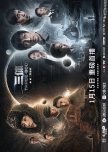Această recenzie poate conține spoilere
Underneath the science and math, it's about human frailties destroying mankind or Earth or both
Plot Summary:
(In chronological order, as opposed to the sequence of events in the drama)
During the Cultural Revolution in China, a budding astrophysicist witnessed a horrific incident that made her lose hope in humanity. Armed with research data and basic math, she was able to figure out that the Sun may be used to amplify radio signals from Earth to the vast space of the universe. She sent a signal through the Sun that was picked up years later by a pacifist alien who advised her not to answer otherwise his less peace-loving colleagues would conquer her planet. Had she regained enough hope in humanity to heed the warning, thus stop exposing Earth's location to the aliens, or did she still think earth couldn't sort its problems out itself and needs to be saved by an alien civilization?
Several years later, top scientists in China are committing suicide, seemingly due to frustration over failed experiments and the dread that physical laws known to man don't apply to the whole universe after all, thus making their life's work pointless. Might the shooter theory supposing that seemingly universal patterns apply only to limited areas and not the whole universe, actually be true? Might physics really not exist?
A nanomatter expert suddenly starts seeing a number in his line of vision and realizes it's a countdown. Countdown to what? He witnesses the universe seemingly blinking. He is invited to participate in a virtual reality game simulating a planet ravaged by a three-body problem causing its civilizations to get obliterated every now and then, haphazardly, with no pattern in the intervals between chaotic and stable eras. The object of the game is to find the pattern, i.e. solve the 3-body problem.
The failed experiments, the countdown and the winking universe are actually caused by photons sent to earth by an alien civilization, Trisolaris, whose inhabitants have given up on their fight against their 3-body problem and are currently on their 400+ years trek to Earth. The photons are monitoring earthlings' progress, making sure, with the help of humans who have joined Trisolarians' impending invasion, that human technology does not advance far enough to rival or even surpass that of Trisolaris by the time they reach Earth. Thus, they are driving scientists suicidal with frustration by tampering with their experiments. When a scientist agrees to stop his experiments, his countdown stops.
What happens when the countdown goes to zero? Is this when murders that look like suicides happen? Would humans, called bugs by Trisolarians, be able to ward off this threat of an alien invasion? Would they be able to help solve the 3-body problem thus obviate the need for Trisolarians to leave their home planet and invade Earth? Would Trisolarians, who cannot abide lies, be able to work with lying humans?
These and other questions may or may not be answered in this drama but they drive the narrative. It will be noted that this drama is based on the first book, "The Three-Body Problem", of a trilogy written by Chinese author Liu Cixin. So, sequels are likely to follow.
Review:
This is the most engrossing Chinese drama I've watched. It's much better than the Netflix version. Aside from the scientific and mathematical discussions, the issues covered - humans treating other humans and the environment despicably to a point that would raise the question of whether man deserves to continue living in this beautiful planet or not - are presented in such a thought-provoking manner that powerfully draws the viewer in. The production, acting and music create a haunting, mysterious and sinister mood that fits the subject matter.
The story emphasizes the fallacy in the conventional belief that more advanced civilizations are likely to be friendly. In fact, history has shown that advanced civilizations tend to subjugate more primitive ones. This drama made me pray that those searching for extraterrestrial life would be circumspect about letting aliens know Earth's position in the universe, much less invite them in.
This drama also revived my awe at how blessed we are to have such a beautiful planet to live in. In this violent universe, planets are more likely to have uninhabitable conditions similar to Trisolaris than Earth. Yet, how are we handling this blessing? By acting like only certain humans have a right to be here, disregarding how our actions affect other occupants of this planet like humans who look different, other animals, plants, land masses and bodies of water.
Three-body is such a drama that can make viewers feel strongly about our beautiful planet as well as human moral frailties such as cruelty, selfishness, pride and dishonesty that could spell our doom.
(In chronological order, as opposed to the sequence of events in the drama)
During the Cultural Revolution in China, a budding astrophysicist witnessed a horrific incident that made her lose hope in humanity. Armed with research data and basic math, she was able to figure out that the Sun may be used to amplify radio signals from Earth to the vast space of the universe. She sent a signal through the Sun that was picked up years later by a pacifist alien who advised her not to answer otherwise his less peace-loving colleagues would conquer her planet. Had she regained enough hope in humanity to heed the warning, thus stop exposing Earth's location to the aliens, or did she still think earth couldn't sort its problems out itself and needs to be saved by an alien civilization?
Several years later, top scientists in China are committing suicide, seemingly due to frustration over failed experiments and the dread that physical laws known to man don't apply to the whole universe after all, thus making their life's work pointless. Might the shooter theory supposing that seemingly universal patterns apply only to limited areas and not the whole universe, actually be true? Might physics really not exist?
A nanomatter expert suddenly starts seeing a number in his line of vision and realizes it's a countdown. Countdown to what? He witnesses the universe seemingly blinking. He is invited to participate in a virtual reality game simulating a planet ravaged by a three-body problem causing its civilizations to get obliterated every now and then, haphazardly, with no pattern in the intervals between chaotic and stable eras. The object of the game is to find the pattern, i.e. solve the 3-body problem.
The failed experiments, the countdown and the winking universe are actually caused by photons sent to earth by an alien civilization, Trisolaris, whose inhabitants have given up on their fight against their 3-body problem and are currently on their 400+ years trek to Earth. The photons are monitoring earthlings' progress, making sure, with the help of humans who have joined Trisolarians' impending invasion, that human technology does not advance far enough to rival or even surpass that of Trisolaris by the time they reach Earth. Thus, they are driving scientists suicidal with frustration by tampering with their experiments. When a scientist agrees to stop his experiments, his countdown stops.
What happens when the countdown goes to zero? Is this when murders that look like suicides happen? Would humans, called bugs by Trisolarians, be able to ward off this threat of an alien invasion? Would they be able to help solve the 3-body problem thus obviate the need for Trisolarians to leave their home planet and invade Earth? Would Trisolarians, who cannot abide lies, be able to work with lying humans?
These and other questions may or may not be answered in this drama but they drive the narrative. It will be noted that this drama is based on the first book, "The Three-Body Problem", of a trilogy written by Chinese author Liu Cixin. So, sequels are likely to follow.
Review:
This is the most engrossing Chinese drama I've watched. It's much better than the Netflix version. Aside from the scientific and mathematical discussions, the issues covered - humans treating other humans and the environment despicably to a point that would raise the question of whether man deserves to continue living in this beautiful planet or not - are presented in such a thought-provoking manner that powerfully draws the viewer in. The production, acting and music create a haunting, mysterious and sinister mood that fits the subject matter.
The story emphasizes the fallacy in the conventional belief that more advanced civilizations are likely to be friendly. In fact, history has shown that advanced civilizations tend to subjugate more primitive ones. This drama made me pray that those searching for extraterrestrial life would be circumspect about letting aliens know Earth's position in the universe, much less invite them in.
This drama also revived my awe at how blessed we are to have such a beautiful planet to live in. In this violent universe, planets are more likely to have uninhabitable conditions similar to Trisolaris than Earth. Yet, how are we handling this blessing? By acting like only certain humans have a right to be here, disregarding how our actions affect other occupants of this planet like humans who look different, other animals, plants, land masses and bodies of water.
Three-body is such a drama that can make viewers feel strongly about our beautiful planet as well as human moral frailties such as cruelty, selfishness, pride and dishonesty that could spell our doom.
Considerați utilă această recenzie?


 3
3 1
1












